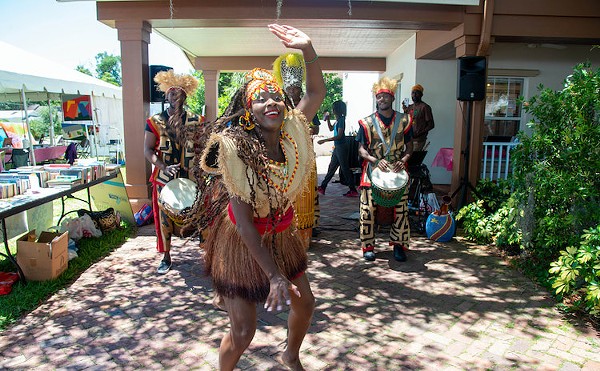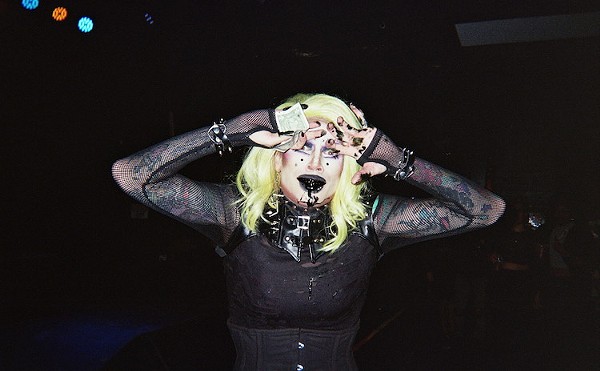As a tragedy of artistic obsolescence, a feminist triumph fable and a pan-gender love story – sometimes all at once – Stage Beauty is, perhaps unavoidably, a mess. For long stretches, it seems poleaxed by the endless mirror reflections of its themes of sexual personae and desire. But it's these very contradictions (along with high-delight–ratio turns by Billy Crudup and Claire Danes) that make the film stay with you. And against a real-world backdrop of increasing gender fascism, Beauty not only provides a refreshing gust of humanity but also delivers a rare pleasure: the sense of a movie in heated argument with itself.
You have to suffer through a pretty awful first act, though, to get to the film's chewy center. Ned Kynaston (Crudup) is Britain's most adored "leading lady," the last of the red-hot drag queens who dominated British theater in the 1600s. ("A woman playing a woman–where's the art in that?" he queries.) For his entire life, Kynaston has been schooled in re-creating male ideas of feminine behavior–a bit of ironic foreshadowing that will lead to his downfall and rebirth. Kynaston's dresser, Maria (Danes), is a dewy-skinned actress manqué performing Shakespeare on the sly in illegal, underground productions. King Charles II (Rupert Everett) catches a show and, at the urging of his ditzy, wannabe-actress lover (Zoe Tapper, in the film's one off performance), declares female impersonation illegal.
Unfortunately, director Richard Eyre (Iris) seems worried about our attention span, resorting to showy rack-focus, handheld, and twitchy zoom shots, while Jeffrey Hatcher's otherwise spot-on script uses anachronisms to no particular effect. But as farce turns to drama, Eyre ditches the showy stuff and the movie hits its stride. Kynaston is reduced to performing he-she shows for drunken louts; Maria's thespian shortcomings offer him a chance to teach her how to really be a woman, and so return him to the legitimate theater.
The path to that homecoming is studded with small, pointed pleasures. The relationship between commerce, art and politics is embodied in the character of a theater director named Betterton (Tom Wilkinson, a veteran of the surface-similar Shakespeare in Love), whose shrugging whorishness is born of melancholy practicality. Much as Christian Bale's journalist in Velvet Goldmine dogged the life of that film's David Bowie stand-in, Samuel Pepys (Hugh Bonneville) watches in awe and plays cheerleader to Kynaston's gender-ID journey.
Filmmaker Eyre never resorts to oversimplification: When Maria is allowed to act, there are no Erin Brockovich-esque you-go-girlisms. Success merely sharpens the focus on her own shortcomings. King Charles is presented as a fool lost in the bubble of privilege; we're invited more to pity than despise him.
Yet the moments endowed with the most tingly fun are those that take place between Kynaston and Maria. Crudup proves what we already knew – that he's a terrific actor – but now he acquits himself as something even better: a class-A showman. And after the mean deglamming she suffered in Terminator 3, Danes comes back radiant, bristling with an off-kilter sexual charge and an almost predatory intelligence.
After his banishment, Maria invites the identity-stripped Kynaston to her place for rest and rehab. She can't resist asking about the minutiae of man-on-man action, but she's more fascinated by its possibilities as a tool for defining herself. After some hemming and hawing, Kynaston claims that guy-guy sex isn't much different than the guy-girl variety.
With no makeup, her hair pulled back and a loose gown affording us occasional glimpses of her small breasts, Maria looks the ideal androgyne. She climbs on top of Kynaston, taunting, "Who am I now, a man?" She lies under him. "Am I a woman now?" That they eventually end up a pile of giggles is adorable; so much for the immutability of sexual power roles.
It's a romantic dream view of gender politics that's endorsed here – one then wrecked in complex high style as both actors (actresses?) undertake a production of Othello late in the film. The production itself is a visceral stunner. The chastened Kynaston plays the Moor soldier with a crazed virility suggestive of a punk-rock Marlon Brando, while Maria's Desdemona becomes an early Blanche DuBois. Even while seemingly endorsing these pre-Method methodologies, the performances criticize it: Are simulated off-the-chart evocations of female suffering more "real" than the stylized mode? Is this enraged masculinity how we define a "real" man? Or is Kynaston really using his return to grace as an ultimate act of drag, lampooning the idea of raw machismo that, as a bonus, also serves to help Maria? The film ends honestly: with an elegant last sentence that's a triumphant declaration of uncertainty.
















